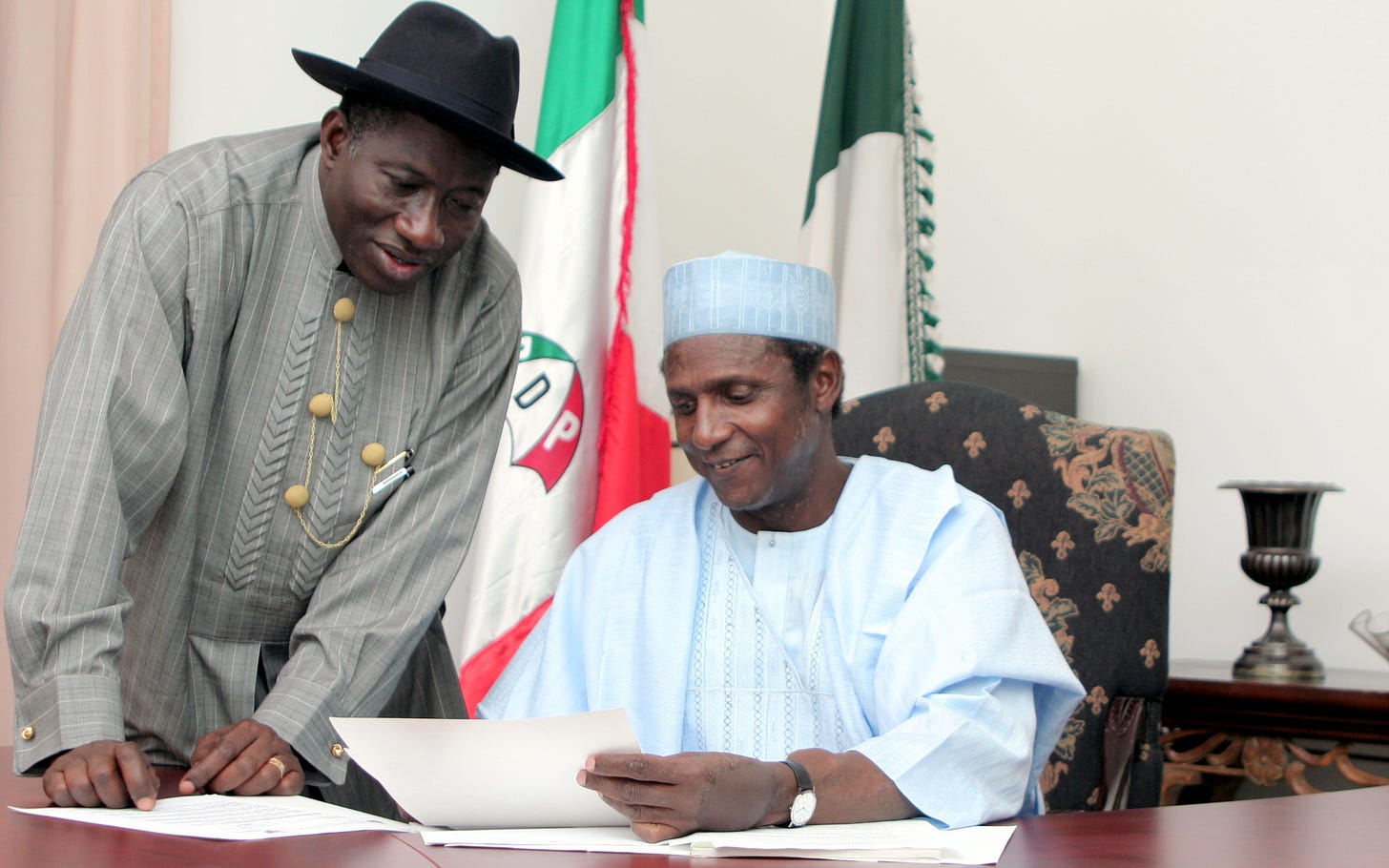Bursting Badenoch's Bubble — PART VI
Bitterness Brewing in Babylon
There had been warning signs.
In May 2011, three months prior to her August start as returning Finance Minister, one of NOI’s old friends, former Cross Rivers State Governor, Donald Duke, was in Washington DC and requested to meet with her, leading to an invitation to come down to her office.
Duke who had tried been governor of the “cleanest state in Nigeria,” had tried to build a tourism and services base for his state, told NOI he had heard rumors that she was due to return as Finance Minister, and asked if there was any truth to them.
When she confirmed he had heard correctly, he said he had brought a message from a group of “concerned” people who were advising her to turn down the offer. Upon querying their identities, he declined, but said she would recognize their names if he did disclose them, and that some even claimed to be her friends.
Their main contention was that her acceptance would
“Give Jonathan and his government credibility,”
And he did not deserve it, thus in the event she did turn the offer, his administration would be weakened and less likely to succeed.
The gravity of the request left her shaken. After all, she reasoned, Jonathan had been elected to office with almost 60 percent of the vote — underling the faith the electorate had in him. Moreover, he had asked NOI to return for another stint as Finance Minister to consolidate on the remarkable reforms she had implemented during her first term, and as she had made clear at the end of it, there was still outstanding work — largely to improve the government’s finances even further, and very crucially, to create jobs for the youth and bolster living standards.
“What about all the people who elected Jonathan?” she asked herself.
“Didn’t they deserve qualified people to serve them?”
Duke underlined he was merely delivering friendly advice and urged her to seriously consider, but ultimately, he departed her office without securing her express commitment to turn the job down.
Brewing Bitterness
Though she was still mulling over President Goodluck Jonathan’s offer to return as Finance Minister, her detractors wasted no time in getting to work.
While still mulling, NOI’s friends and family alerted her to a series of proactive attacks published by Nigerian online news platform Sahara Reporters calling her credibility into question.
“Why?” you may wonder.
The flourishing bitterness dates back to the preceding president to Jonathan, Musa Yar’Adua. The latter was elected to office in 2007 and was expected to govern for two terms — or eight years, as is consistent with the unspoken ‘Federal Character’ agreement that power should rotate between the North and South of the country — both regions serving a maximum of eight years (“to me, to you”) each into perpetuity.
However, Yar’Adua had a chronic kidney ailment dating back to when he was elected; an ailment that Nigerians were unaware of. The true state of the president’s health was shrouded in secrecy, and it was only in 2009 when he departed to both Germany and Saudi Arabia for extended periods to treat his conditions that Nigerian’s began to gain a clearer picture.
When Yar’Adua left for Saudi Arabia on Nov 23rd, 2009, he failed to transfer power to his VP Goodluck Jonathan. Officially, the country was ungoverned and running on autopilot. According to Adam Nossiter’s report in a January 12, 2010, New York Times article:
‘Hundreds of angry Nigerians marched down this capital’s [Abuja] broad avenues on Tuesday to protest the long absence of their president . . .’[i]
Unofficially, rumors abounded that a secret cabal of largely northern politicians were effectively taking care of affairs. Many social issues threatened the continued existence of the country such as Islamist terrorism, Niger Delta politics and so on. To this end Nossiter wrote:
‘Nigerians have been left perplexed about their apparently rudderless nation. . . The Nigerian’s president’s long absence and his failure to transfer power during this period to Vice President Goodluck Jonathan, who comes from a different region, have led to “the complete distortion,” Mr. [Wole] Soyinka said in a brief interview. Some protestors alleged that the northerners surrounding Mr. Yar’Adua were reluctant to yield power and its perquisites to those from the ethnically separate south.’
It was only due to growing pressure from the public that led to Jonathan being sworn in as caretaker president in May 2010, pending elections the following year. That he won the election led many, largely from the north, to see his presidency as illegitimate, Jonathan convincingly defeating his opponent Mr. Muhammadu Buhari, by a twenty-six-point margin.
Anyway . . . back to Sahara’s shenanigans.
On one particular evening reserved for family time, NOI received a phone call from a number she did not recognize. Much to her shock, it was a call from Omoyele Sowore, publisher of the Sahara Reporters. As the call was made to a her private line reserved for close relations and loved ones, thus she was perturbed by how he managed to obtain it. When she asked, he said that she was a public servant and he had a right to call her at any time.
Shortly after, a recording of the phone call surfaced online without her permission. Talk about a violation!
The publication was churning out spurious reports of NOI at a relentless pace. Some attacked her credibility citing — very remarkably and brazenly due to contrary evidence — her past performance was insufficient. Others claimed she was trying to secure power via the back door. Some unfoundedly claimed she only took the role for its perks and others claimed she stole money.
One of the major motivations for NOI’s return was her desire to build on the momentum of accountability mechanisms she had put in place in 2004−05. To avoid leakages, she had got the government to publish the revenue, on a monthly basis, of all thirty-six states, but once her term was up the practice had stopped; something which became a pressing priority to revive.
Ultimately the media bullying and intimidation tactics did not dissuade her but rather motivated her to accept the offer to return as Finance Minister. Following advice from her boss at the World Bank to agree parameters with the president such as direct access to him and a competent Economic Team, the deal was done.
[i] Nossiter, Adam, “Protest in Nigeria Over Absent Leader Led by Nobel Laureate and Writer Wole Soyinka,” New York Times, January 12, 2010






